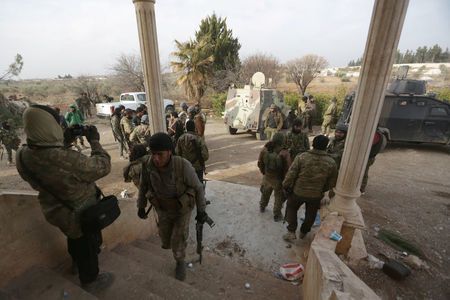The Syrian opposition have settled their issues toward participation in the Geneva conference and named their delegation to the talks, meanwhile acting forces on the ground are pushing to improve their situation in the field in an attempt to push any political gains toward their interests and their vision for a solution.
The battle over the formation of the opposition coincided with battles on the ground in all regions of Syria, especially in the country's east, where there is an international, local and regional conflict of wills to achieve new facts on the ground.
In this context, the Free Syrian Army forces within the Euphrates Shield operation managed to take control over important areas in the west and north of the city of Al-Bab, which the Islamic State controls. This coincided with clear political and military messages that Turkish President Recep Tayyip Erdogan is eager to deliver gains before the start of a tour that includes a number of Gulf states, related especially with moving forward in military operations toward the Syrian city of Raqqa, the de facto capital of the ISIS group, in addition to establishing a safe zone in Syria.
Erdogan announced that after liberating the city of Al-Bab, the orientation would direct itself east toward Manbij and Raqqa, indicating that the final aim for Turkey was to clear 5,000 sq. km in northern Syria to establish a safe zone to prevent migration from Syria, in addition to the return of those residing in camps inside Turkey to Syria. The president confirmed the powerlessness to establish a safe zone in Syria without a no-fly zone, indicating that he is discussing this issue with Russia and the United States and the United Nations Secretary-General Antonio Guterres, saying that, "It would suffice for the UN Security Council to issue a resolution in this respect, and it is possible after that to move to the stage of implementation."
Erdogan's comments about the safe zone came at the same time as Euphrates Shield forces backed by Turkey achieved an advance north of the city of Al-Bab, taking control of the roundabout at the entrance of the city from the southern side. The Hawar Kilis Operations Room said that the groups had been able to take control of this point, the sports club, the party building, silos, and Zamzam street in the city of Al-Bab after fighting with ISIS militants. The importance of taking the southern entrance to the city of Al-Bab means subsequently cutting off the roads before the advance of Bashar al-Assad's forces to the city.
The groups of the Euphrates Shield alliance had previously managed to take control of Sheikh Aqil Mountain, the national hospital, the western roundabout, and the youth housing west of the city of Al-Bab, after new military reinforcements were sent to the environs.
The Assad regime forces took control of the strategic town of Tadif south of the city of Al-Bab with the support of Russian aircraft, and with that these forces have reached the dividing line with the Euphrates Shield forces, which the Russian Defense Ministry spoke about in a statement last Saturday, indicating that he had coordinated around this line with the Turkish side.
Military sources in the Syrian opposition expected that the Euphrates Shield forces, after taking control of the city of Al-Bab and clearing it of ISIS fighters, would head south toward Deir Hafer and Maskanah with the aim of approaching the city of Raqqa.
The Ghouta and Daraa
The escalations on the ground are not limited to the country's east. The pace of attacks by the regime forces on the eastern fronts in the eastern Ghouta have increased since the beginning of the ceasefire, as regime forces backed by foreign militias have been trying to advance to a group of villages under heavy fire cover. Opposition fighters have recovered a number of points east of Hazerma after a joint military operation between Jaish al-Islam (Army of Islam), Ahrar al-Sham, and Faylaq al-Rahman, which resulted in the deaths of about 13 regime and Iranian fighters, in addition to the destruction of more than six tanks.
The regime forces were able over the last few weeks to advance in the towns of Qassmiyeh and Al-Bahariyeh in the eastern Ghouta with the aim of reaching the rebel headquarters in Douma. This is despite the ceasefire deal in Syria entering into effect at the end of last December.
The UN envoy to Syria, Staffan de Mistura, said that the prevailing situation in the eastern Ghouta in the Damascus countryside was threatening the planned negotiations in Geneva.
In the city of Daraa in the south of the country, FSA factions on Sunday launched a new campaign under the name "Death rather than Humiliation" with the aim of striking the regime bases in the Manshiyeh district in Daraa.
The regime forces, for their part, responded by announcing a counter-battle named "We will humiliate you and kill you," with the aim of taking control over the entire Manshiyeh district.
This article was translated and edited by The Syrian Observer. Responsibility for the information and views set out in this article lies entirely with the author.


